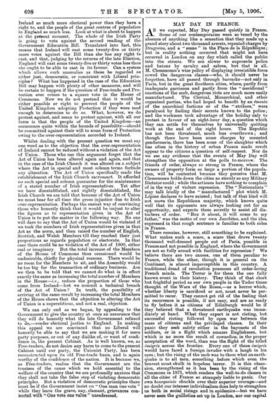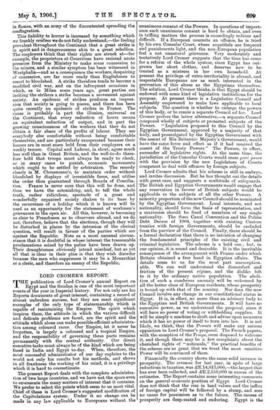MAY DAY IN FRANCE.
AS we expected, May Day passed quietly in France. Some of our contemporaries were so vexed by the absence of anything like a sensation that they made up a. grand story about two thousand arrests, repeated charges by Dragoons, and a " scene " in the Place de in R6publique; but in reality nothing occurred that might not have occurred in London on any day which called the public. into the streets. We are slower to supersede police and batons by cavalry and sabres, but that is all. M. Clemenceau's wise policy of displaying irresistible force cowed the dangerous classes—who, it should never be forgotten, have all passed through barracks—not only in Paris, but in the great Southern cities, where, partly from inadequate garrisons and partly from the " meridional " emotions of the mob, dangerous riots are much more easily manufactured. The Clerical, Monarchical, and other organised parties, who had hoped to benefit by an etneute of the anarchical factions or of the "strikers," were paralysed by finding their secrets known to the police; and. the workmen took advantage of the holiday only to protest in favour of an eight-hour day, a question which they can settle for themselves by universally quitting work at the end of the eight hours. The Republic has not been threatened, much less overthrown ; and though there have been some charges by mounted gendarmerie, there has been none of the slaughter which has often in the history of urban France made revolt appear to the citizens a question of self-respect. Nor do we see any evidence that the events of May Day will strengthen the opposition at the polls to-morrow. The friends of order, always so strong in France, where the owners of property form so large a portion of the popula- tion, will be contented because they perceive that M. Clemenceau holds down the cities as sternly as auy Military Dictator could; while the artisans have nothing to complain of in the way of violent repression. The " Nationalists " may talk loudly of the " manufactured " plot which M.. Lepine declares to have existed ; but talk of that kind will not move the Republican majority, which knows quite, well that its opponents are always looking out for an opportunity, and expects them secretly to assist all dis- turbers of order. "Box it about, it will come to my father," was the motto of our own Jacobites, and the idea expressed in that rough sentence is familiar to both sides in France.
There remains, however, still something to be explained. What makes such a scare, a scare that drove twenty. thousand well-dressed people out of Paris, possible in France and not possible in England, where the Government are not so fully armed with facilities for repression ? We believe there are two causes, one of them peculiar to France, while the other, though it is general on the Continent, is almost imperceptible in this country. A traditional dread of revolution possesses all order-loving French minds. The Terror is for them the one fully known event in their history. They think of that short but frightful period as our own people in the Tudor times thought of the Wars of the Roses,—as a horror which, whether liberty is sacrificed or not, must never be per- mitted to recur. They cannot get rid of the feeling that its recurrence is possible, if not easy, and are as ready to fly before it as citizens of Edinburgh would be if they believed that a threatened earthquake was imme- diately at hand. What they expect is not rioting, but successful rioting followed by open war between the mass of citizens and the privileged classes. In their panic they seek safety either in the bayonets of the soldiers, or in a flight which amazes Englishmen, but which is no more the result of cowardice, in the proper acceptation of the word, than was the flight of the titled émigrés across the frontier. Every one of these gmigres would have faced a foreign invader with a laugh in his eyes ; but the rising of the mob was to them what an earth- quake is to all men, something , before which even the bravest must skulk in hopeless terror. It is this obses- sion, strengthened as it has been by the rising of the Commune in 1871, which renders the well-to-do classes in all the cities of France so strangely liable to panic. Our own bourgeoisie chuckle over their superior courage--and no doubt our intenser individualism does help to strengthen us both in social risings and in epidemics—but we have never seen the guillotine set up in London, nor our capital in flames, with an army of the discontented spreading the conflagration.
This liability to horror is increased by something which we frankly confess we do not fully understand,—the feeling prevalent throughout the Continent that a great strike is in spirit and in dangerousness akin to a great rebellion. The employers think that their rights are struck at—for example, the proprietors at Courrieres have resisted acute pressure from the Ministry to make some concession to the miners, and a similar symptom has been witnessed in Westphalia—and as a consequence the workers, despairino, of concession, are far more ready than Englishmen to resort to bloodshed. A strike therefore tends to become a modified civil war, and on the infrequent occasions in which, as in Milan some years ago, great parties are inciting the strikers a strike becomes a movement against society. An epidemic of strikes produces an impres- sion that society is going to pieces, and there has been quite recently an epidemic of strikes in France. The cause is probably in part the illusion, universal on the Continent, that every reduction of hours means an equivalent reduction of output, and in part the growing consciousness of the workers that they do not obtain a fair share of the profits of labour. They see everybody else comfortable without being comfortable themselves, and are particularly exasperated because their houses are in most cases held from their employers on a weekly tenure. Capital and Labour, in short, agree much less well than in Great Britain, and the well-to-do there- fore hold that troops must always be ready to check, or in many cases to punish, economic movements which ought to be settled by arbitration. The remedy clearly -is M. Clemenceau's, to maintain order without bloodshed by displays of irresistible force, and utilise the order thus guaranteed through Boards of Concilia- tion. France is never sure that this will be done, and thus we have the astonishing, and, to tell the whole truth, rather ridiculous, spectacle of a great and wonderfully organised society shaken to its base by the recurrence of a holiday which it is known will be used as an opportunity for the statement of workmen's grievances in the open air. All this, however, is becoming as clear to Frenchmen as to observers abroad, and we do not, therefore, believe that the elections, though they will be disturbed in places by the intrusion of the clerical question, will result in favour of the parties which are against the Republic. Note as a most unusual circum- stance that it is doubtful in whose interest the treasonable proclamations seized by the police have been drawn up. Their draughtsmen obviously intend mischief, but as yet all that is clear in their plan is that they wish disorder because the man who suppresses it -may be a Monarchist or a cleric, and therefore an enemy of the Republic,









































 Previous page
Previous page